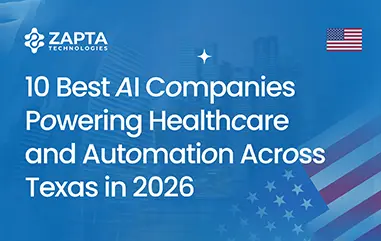If you’re running a healthcare business and ignoring tech advancements, you’re setting yourself up for irrelevance.
Patients are not merely customers; they rely on healthcare providers for service and compassionate care. They seek a seamless experience that makes them feel secure and supported. And technology plays a huge role in meeting those expectations. When you integrate the right solutions into the healthcare system, it improves your operations and builds trust and loyalty among your customers.
The role of AI Custom Software Development In Healthcare
Having AI custom software development that’s built based on the unique needs of healthcare providers, practitioners, and patients is the first step to staying in the game. It will ensure you can interoperate between different medical systems, reduce administrative burdens, and improve patient outcomes.
Let’s look at some examples to help you understand better;
Several types of custom healthcare software are widely used to streamline operations and enhance patient care, including:
Electronic health records (EHR) systems: customer EHR solutions let you store, retrieve, and manage patient records efficiently without compromising privacy regulations.
Telemedicine platforms: personalized telehealth applications support visual consultation, remote patient monitoring, and secure communication between doctors and patients.
Patient management tools: these systems assist in scheduling appointments, managing patient data, and improving coordination among medical teams.
And that’s not all. Every healthcare business is unique in itself and you can get yourself a AI custom software development that’s well aligned with your specific goals.
Key Benefits of AI Custom Software Development in Healthcare
The healthcare industry is not one size fits all and neither should its software be. Off-the-shelf software often falls short of addressing the unique workflows, compliance requirements, and patient engagement needs of modern healthcare organizations. AI custom software development bridges these gaps, delivering precision-built solutions that enhance care delivery, optimize operations, and fortify data security.
Enhanced patient care:
Unlike generic solutions, tailored software lets you develop hyper-personalized treatment plans by using AI-driven analytics, real-time patient vitals, and comprehensive medical histories. With the integration of machine learning and clinical decision support systems, you can analyze vast data sets to identify patterns, minimize diagnostic errors, and recommend optimized treatment strategies in real-time. This level of precision ensures that providers are not merely addressing symptoms but proactively improving patient outcomes through data-backed customized care.
By embedding intelligence into healthcare applications, custom software enhances both the accuracy and efficiency of medical decision-making, ultimately elevating the standard of patient care.
Streamlined operations:
In healthcare, every second is crucial, and administrative inefficiencies are the last thing you want to deal with because they directly impact patient care. AI custom software development solutions can automate critical yet time-consuming tasks like appointment setting, medical billing, and insurance verification reducing the administrative burden on healthcare professionals. Instead of navigating fragmented systems, you can gain access to a seamless interconnected platform that enhances communication between departments. When doctors, nurses, and administrators can retrieve patient records, treatment histories, and test results in real-time delays are minimized and care becomes more coordinated.
This not only improves internal workflows but also enhances the patient experience, reducing wait times and ensuring timely, well-informed medical decisions. By eliminating bottlenecks and enabling a more fluid, efficient system, AI custom software development allows healthcare providers to focus on what truly matters—delivering high-quality care.
Data security and compliance:
Trust is everything. Patients hand over their most sensitive information medical histories, diagnoses, and personal details expecting it to remain confidential. But cyber threats are on the rise, and regulations like GDPR and HIPPA keep evolving and regular software simply don’t cut it. AI custom software development solutions comes with built-in encryption, multi-factor authentication, and AI-driven threat detection, to ensure that patient data is locked down tighter than ever. More importantly, they adapt as new regulations emerge eliminating the constant struggle of retrofitting outdated systems.
When data is secure, trust is reinforced, and when trust is reinforced, patients feel safe. In an industry where privacy is as critical as the care itself, security can’t be an afterthought it has to be the foundation.
Scalability and flexibility:
Healthcare isn’t static, it evolves with new treatments, technologies, and patient demands. Yet, many organizations find themselves trapped in rigid, off-the-shelf systems that can’t keep up. Custom software changes the narrative. Designed to scale effortlessly, it grows alongside expanding facilities, new specialties, and rising patient volumes without disrupting operations.
More than that, it seamlessly integrates with its AI-powered AI embedded applications diagnostics, and IOT-enabled remote monitoring robotic-assisted surgeries ensuring you are always equipped for what’s next. Instead of struggling with outdated software that limits innovation, organizations with custom solutions stay ahead of the curve, embracing change without compromise. In a field where adaptability can mean the difference between stagnation and progress, flexibility is rather a necessity than a luxury.
The Right Technology Partner Makes All the Difference
Technology alone doesn’t solve healthcare’s challenges, the right technology, built by the right partner, does. Off-the-shelf solutions may offer convenience, but only AI custom software development company can truly align with the unique demands of your organization. Whether it’s improving patient care, streamlining operations, ensuring airtight security, or scaling with future advancements, the key is working with a team that understands both technology and healthcare.
You need a partner who doesn’t just write code but translates your real-world challenges into seamless, efficient solutions. The future of healthcare isn’t just digital it’s tailor-made. The question is, who’s building yours?


.webp)














